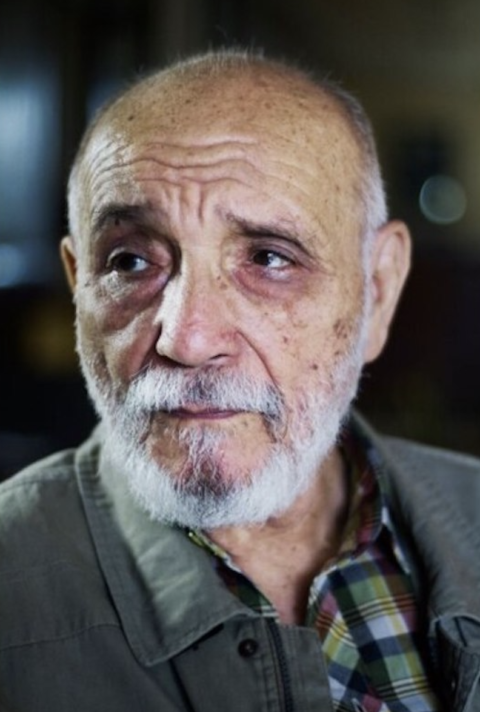 Born in 1933 in the village of Barrancas in Oriente, Cuba, Rafael Alcides developed as a poet in the city of Havana, where he arrived in 1953. It was also in that city where he had been conceived by his 13-year old mother, seduced by a traveling salesman who took her on a sightseeing trip to the capital. At the age of 14, a year after his mother’s death by self-immolation, Alcides himself began his trek westward toward the capital. When the revolution triumphed in 1959, he worked for the Ministry of the Exterior of the new government, eventually becoming its chief press officer. Through the ministry he hosted a television program dedicated to interviewing foreign political figures visiting the island.
Born in 1933 in the village of Barrancas in Oriente, Cuba, Rafael Alcides developed as a poet in the city of Havana, where he arrived in 1953. It was also in that city where he had been conceived by his 13-year old mother, seduced by a traveling salesman who took her on a sightseeing trip to the capital. At the age of 14, a year after his mother’s death by self-immolation, Alcides himself began his trek westward toward the capital. When the revolution triumphed in 1959, he worked for the Ministry of the Exterior of the new government, eventually becoming its chief press officer. Through the ministry he hosted a television program dedicated to interviewing foreign political figures visiting the island.
After Fidel Castro openly supported the Soviet invasion of Czechoslovakia in 1968, Alcides became disillusioned with the Castro regime, beginning a process that culminated in 1993 when he withdrew from all public and literary activities. His work was censured by the government and he entered a voluntary internal exile, often called insilio in Cuba, which lasted until 2011.
— Pablo Medina, translator
/ / / / /
The Stranger
O traveler,
suffer,
weep,
kneel before yourself.
Around you
the world fell apart
and recomposed itself.
You saw the buildings of your childhood fall,
the new avenues go by,
the skyscrapers appear,
twice they expanded the cemetery.
You were a tree, a tower,
a granite mountain
standing firm against the hurricane,
and that was your glory
for some time. Today
you are the stranger, the intruder. Your planet
no longer exists.
You are afraid of yourself.
*
Nobody
To immortalize him
they built a statue.
Then time passed,
the wars came,
the exoduses. Occupied
and sacked without respite,
the city knew fire
century after century,
and the ashes from the flames
floated over the ruins
leaving behind a snowy color
along the whole millenium.
On a whim,
for reasons of state
or to take it as a trophy
on a mule’s back,
an invader tore the plaque
that told the biography
of that immortal man.
But the statue, afraid, resisted.
It is still there,
traveler, standing
and watching eternity pass by
from the famous park
with the timeless name:
“Little Nobody’s Park.”
*
He Can
The monarch can
piss on your garden
(and he pisses:
for the pleasure of hearing
the stream hit
your ferns and begonias).
He can eat
the apples of your orchard
(and he eats them,
with honey from your hive
and milk from your cows).
He can hand you a lance
and send you off to war
(he’s always making up wars,
the monarch).
He can charge you for the air
you breathe (and he charges you)
or he can poison it:
the mere presence
of his breathing
in this world is poison.
He can have a sky and a road
sewn out of doves and roses.
He can build statues
and temples that proclaim his glory
to the four winds.
Under the realm’s skies
the monarch can do anything
(Anything, Lord?).
/ / / / /
EL EXTRAÑO
Oh viajero,
sufre,
llora,
arrodíllate delante de ti mismo.
En torno tuyo
el mundo se deshacía
y se reorganizaba de nuevo.
Viste caer los edificios de tu infancia,
pasar las nuevas avenidas,
aparecer el rascacielos,
dos veces ampliaron el cementerio.
Fuiste un árbol, una torre,
una montaña de granito
resistiendo frente al huracán,
y esa fue tu gloria
durante un tiempo. Hoy
eres el extraño, el intruso. Tu planeta
no existe ya.
Tú mismo te das miedo.
*
NADIE
Para inmortalizarlo
le erigieron una estatua.
Después pasó el tiempo,
llegaron las guerras,
los éxodos. Ocupada
y saqueada sin descanso,
la ciudad conoció el fuego
un siglo y otro siglo,
y las cenizas de sus llamas
flotaron sobre las ruinas
dejando un color de nieve
a lo largo del milenio.
Por capricho,
por razones de Estado
o para llevársela de trofeo
a lomo de mulo, pudo
un invasor
arrancar del monumento
la tarja que recordaba
las señas de aquel inmortal.
Pero la estatua resistió.
Asustada, hela ahí,
aún, viajero, de pie
mirando pasar la eternidad
en su famoso parquecito
de nombre ya inmemorial:
“El parquecito de Nadie.”
*
PUEDE
Puede el monarca
orinarse en tu jardín
(y se orina:
por el gusto de oír su chorro
cayendo sobre los helechos
y las begonias.)
Puede comerse las manzanas de tu huerto
(y se las come,
con la miel de tus colmenas
y la leche de tus vacas).
Puede ponerte una lanza en la mano
y mandarte a la guerra
(y siempre está ideando una guerra
el monarca).
Puede cobrarte el aire que respiras
(y te lo cobra)
o envenenártelo:
(su sola presencia
respirando en este mundo, de hecho
lo envenena).
Con rosas y palomas
puede hacerse tejer
un cielo y un camino.
Puede erigir estatuas
y templos que proclamen su gloria
a los cuatro vientos.
Bajo el sol de este reino
todo, en fin, lo puede el monarca
(¿Todo. . ., Señor?)